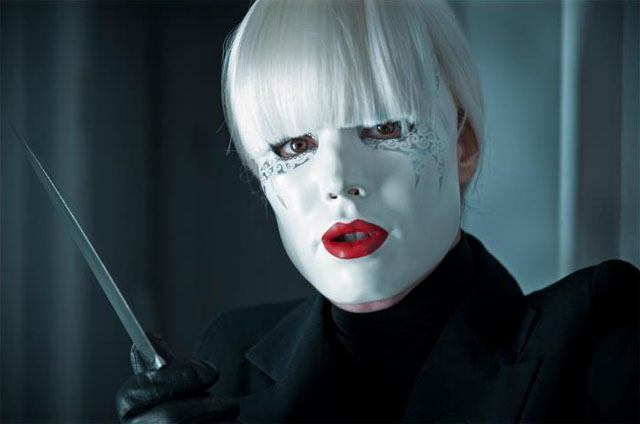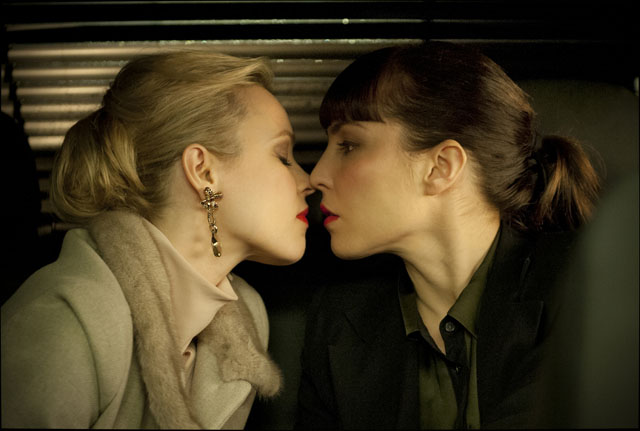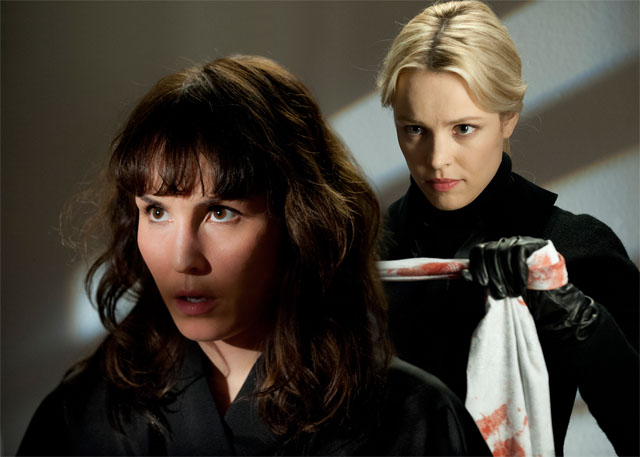Introducing his interview with Brian De Palma for the Los Angeles Times, Mark Olsen notes that Passion is “a remake of Alain Corneau‘s 2010 French thriller Love Crime, which starred Kristin Scott Thomas and Ludivine Sagnier as a seasoned executive and an up-and-comer locked into a dynamic of flirtation and manipulation that turns deadly. Pauline Kael, writing about De Palma’s 1976 film Carrie—coincidentally enough itself being remade by Kimberly Peirce with Chloë Grace Moretz in the title role—declared the filmmaker as having ‘the wickedest baroque sensibility at large in American movies.’ His movies come less frequently nowadays, but his sly sense of self-reference, his own heightened awareness of the Brian De Palma-ness of a Brian De Palma film, hasn’t abated with age, making his take on someone else’s film both a devilish thriller all its own and a fascinating study in directorial authority.”
Guy Lodge, who’s been looking forward to De Palma’s “return to the kinky Venetian-blind thriller territory of Body Double and Femme Fatale,” finds no joy in writing at In Contention that Passion, “quite contrary to its title, is an eerily bloodless (if briefly ketchup-stained) contraption, a film noir so ploddingly un-alive to its own absurdities that its peaks of bad taste are rendered troughs by virtue of sheer humorlessness. Were De Palma’s name not on the thing, you’d assume it was the work of a genre journeyman with a hard-on for Dressed to Kill—and even then only in the second half, when the lighting scheme abruptly shifts into trademark high-contrast horizontals, an elaborate ballet-focused split-screen sequence signifies nothing in particular, and Pino Donnagio’s [soundtrack] begins paying screeching homage to Bernard Herrmann, who had already playfully Xeroxed his style for DePalma in the 1970s. As arguably the most openly postmodern of the cine-literate generation of American auteurs that came to prominence 40 years ago, DePalma’s work has never belonged wholly to itself, but his frame of reference is oddly small and self-serving here.”
“Having reached a nadir in his mercurial career with conspicuous flops The Black Dahlia (2006) and Redacted (2007), Brian De Palma returns after a half-decade hiatus,” begins Neil Young in the Hollywood Reporter. “And while this steamy chronicle of professional and romantic jealousies at a Berlin ad-agency—a sort of Mad Women—showcases eye-catching co-lead turns from Noomi Rapace and Rachel McAdams, [Passion] proves less a comeback for De Palma and more what economists call a ‘dead cat bounce.'”
“Clearly, Passion means to be a hoot, a wet-dream thriller for cinephiles,” writes Justin Chang for Variety. “But by the time it reaches its overwrought final act, the picture has generated neither the tension of its forebears nor the audacity that would allow it to transcend its silliness, a la De Palma’s 2002 tour de force, Femme Fatale. Yet even in the absence of stellar material, the leads remain compulsively watchable: McAdams may lack Scott Thomas’s hauteur, but more than makes up for it in cool, svelte malevolence, while Rapace provides an energetic counterweight, lending her more naive but also more unpredictable Isabelle an edge of dark desperation.”
“After one particularly cruel bit of theater orchestrated by Christine to humiliate Isabelle, any relationship the film once had to realism goes out the window as Isabelle slips down a wormhole of depression and sleep deprivation.” Jamie Dunn for the Playlist: “As she cracks, so too does the film. The angle on cinematographer José Luis Alcaine’s Dutch tilt is set to jaunty, and his lighting to expressionistic. Scene by scene the tone becomes more hallucinatory, and by the end of the film De Palma has bombarded us with enough feverish dreams-within-dreams-within-dreams-within-dreams to make Christopher Nolan’s head spin.”
“[E]ven the sexual decadence is of the clichéd lace and carnival-mask variety,” notes Lee Marshall in Screen. “Fumbling the halfway-point genre-shift that is managed so effortlessly in the French original, De Palma glues together what feel like two different films in the remake: a female rivalry drama-thriller, and a murder mystery. And although the exercise carries an undertow of tongue-in-cheek pastiche, this is so inconsistently applied that if feels like an escape clause.”
“Redacted, with its fragmented approach and centerless viewpoint, still seems like a thorn in Passion’s side,” suggests Tommaso Tocci at Press Play. “In the newer film, the classic De Palma milieu—doubles, voyeurism, camera movements, split screens, etc.—greets viewers like a cozy living room after a long vacation, but you’ll find that this is milieu coated in digital frenzy and wild proliferation of recorded footage.”
Passion has screened in Competition in Venice and will be a Special Presentation in Toronto.
Update, 9/10: “[T]here comes a point about a third of the way into Passion where a switch is flipped—signaled by an over-the-top music cue, aptly—and the movie becomes a De Palma film, with all the operatic moves and excess that implies.” Noel Murray at the AV Club: “I may never be able to explain to non-fans why that’s so satisfying to me, any more than I could explain the magnificence of Van Morrison to someone who finds his voice grating. I can only tell you that what I feel is real and true, and that once it got rolling, Passion delighted.”
Scott Tobias: “As a De Palma acolyte—Noel and I did this recent Primer on him—Passion was my most anticipated movie of the festival, and for a time, well on its way to being my biggest disappointment…. But as Noel suggests, Passion doesn’t kick into gear until the second half, when De Palma’s labored plotting ends and he can finally uncork one dazzling setpiece after another.”
Updates, 9/15: Notebook editor Danny Kasman: “It is an old man’s movie par excellence, taking film history as the subject of a work of cinema that would better fit within the context of the experimental works in the Wavelengths section than in the multiplex in which it was shown, seemingly baffling an audience expecting a semblance of realism from the screen. Its oldmanness is the deep, precise pursuit of the conventions of the cinema De Palma has been engaging with for the length of his career, and thereby engaging his career itself…. The lucid, confrontational clarity of the digital images renders the film’s hermetic artifice—despite being often photographed on location—even more dissonant, heightened and abstract. The archness of the film is absolute. It is a work of cinephilia but one which remarkably takes the form of a step forward—it’s an object that exists in the continuum of the subject that it is studying.”
And Fernando F. Croce replies: “Ah, Passion. Perhaps not the film of the festival for me (that’s still Like Someone in Love), but certainly the one that most tickled my cinephilia. Like Kiarostami’s film, it’s a wondrous feat (a series of feats, really) of misdirection…. It’s a crazy, thorny spiral of a movie, not ‘campy’ but funny. Think of McAdams, done up like a parody of Grace Kelly (her blonde hair for some reason looking like a wig) in her wood-paneled office with the word ‘IMAGE’ spelled in red, blocky letters behind her. Or of Rapace ramming her car into a Coke machine (De Palma’s Godardian side is always present), followed by a crying jag and a sudden rain that are, like everything on screen, not what they seem.”
Christoph Huber, writing in Cinema Scope, De Palma “orchestrates this vintage ’80’s trash fodder with beyond-postmodern digital abandon, as if to embalm a lost culture, and especially his own work, down to the obligatory split-screen scene…. Unless Passion is a documentary about the Berlin Republic, represented by the capital’s most hellish stretch (not unfamiliar to Berlinale sufferers) as glossy poster art, in which case it is one of the most depressing exposés of recent years.”
“Close readings of De Palma’s work in this mode often prompt accusations of shallowness and questions regarding the level of seriousness at play beyond the surface,” writes Jordan Cronk at the House Next Door. “And if Passion does indeed lack substance, I’d argue that it features at least the necessary amount of subtext to carry it’s outlandish plot past parody (which it does directly engage with on occasion) and into the realm of social and economic commentary.”
“McAdams, usually a winning personality, seems embarrassed by her presence here,” finds Time‘s Richard Corliss, “and Rapace, who invested a Mensa fury into her Lisbeth Salander in the Swedish Girl With the Dragon Tattoo trilogy, looks frightened, as if assaulted by the camera’s glare.”
For Time Out New York‘s Joshua Rothkopf, “the vigor this director once lent to the sleaze is gone. Dream sequence after dream sequence, you’ve seen it all before (and better). My depression was palpable.”
“Passion simultaneously parodies its plot while elevating it to a strangely involving exercise in cinematic drama,” finds indieWIRE‘s Eric Kohn.
Simon Abrams talks with De Palma for Press Play.
Venice and Toronto 2012: a guide to the coverage of the coverage. For news and tips throughout the day every day, follow @KeyframeDaily on Twitter and/or the RSS feed. Get Keyframe Daily in your inbox by signing in at fandor.com/daily.






